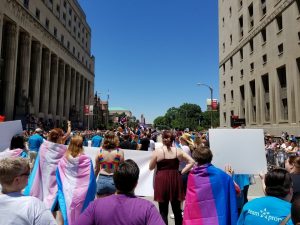Editor’s Note: This blog comes to us from Sayer Johnson, who blogged for IJFAB Blog in the past on the issue of how clinicians respond to trans patients. Here, Mr. Johnson reaches a frustrated breaking point with the way that researchers wanting to work with trans persons behave in the process of recruiting their research participants. The alert reader will note echoes of important research ethics work on community participant research, especially that done with indigenous communities and with other ethnic minorities and with the disability community (“nothing about us without us” is a good slogan for any researcher to keep in mind). This is just as relevant for working with transgender persons. Yet as Mr. Johnson illustrates, the message isn’t getting through, and the lessons research ethics has already learned are not being implemented well and pervasively.

Mr. Sayer Johnson, social worker, Papi and husband, lifelong activist, and co-founder and Executive Director of the Metro Trans Umbrella Group. He worked with MTUG and the University of Missouri St. Louis to create and sustain an annual conference on the needs of the transgender community and has just released a documentary called TransGeek. He is the founder of the Queer Trans Flat, which provides housing in St. Louis for queer trans humans who have had difficulty finding stable housing. He is working to create power for trans persons in the St. Louis area.
Get ready. This is an early morning rant on being inundated with asks for lab rats AKA research participants. Researchers often start by contacting local advocacy organizations like us (the Metro Trans Umbrella Group, or MTUG, which serves trans humans in the St. Louis Metro Area). Fine. But the way it’s done is a big ethical problem.
First of all please stop with the $20 amazon gift cards. To use these, humans have to have a certain way to navigate the internet and life, and this doesn’t work for people with temporary housing who can’t have a reliable address for package delivery. Humans also have to be able to pay for shipping on their own, and when you’re struggling to survive, what will $15 on Amazon get you, with another $5 for shipping? I mean let’s get more creative with incentives. Maybe bus passes or hormone discount cards or Aldi gift cards. Or cash. Or better yet sit down with folks doing the work and ask us what we need.
Consider paying the non-profit who you want to engage research participants with the emotional labor (no we are not going to share our listserv with you; that can put people at risk). And ok I hear you. Your grant hardly covers your cost. I am reasonable, mostly.
How about instead of sharing the collected data with us 2 or 3 years later in an academic form that reads like stereo instructions you all do something more meaningful? How about “Hey tiny struggling non-profit when we have this data we are going to sit with you and help you write grants based on this data”? We apply for grants to support our services to our community members, and these grants need data to justify the work and you have experience with grant-writing. Say, “We aren’t just going to use it as a feather in our academic cap to try for tenure we are going to lift you up! Thank you for your emotional labor and we are going to partner with you in a meaningful way “
Make this part of the work you do. Have a data agenda.
Make relationships with targeted population. I have made efforts with folks asking for us to help with research, asking in return that they come out for a work day or garden day to support us and meet us face to face. Humans have followed up two times out of maybe twenty invitations. I am developing a blanket response to these asks. I think I will say all requests for data collection must be done in person over coffee at a minimum. Then I can lay it out. I have had three cold calls this week, alone. They maybe drop a name in common but there is no relationship. I need at least a cup of coffee and to see the intention in your face. That is the way I move in the world.
Invest in and reward your target population. Support our volunteer efforts. Acknowledge the gift of our time and labor. I get the “no cash incentives” issue (though I also know that the University of California IRB has approved at least some studies using cash incentives). But for Rick’s sake, can we do better than the Amazon gift cards? At a minimum, grants should include feeding participants who have to come to a research site.
By all means, make your fancy data collection book or research paper or whatever. Use our data, but then sit down with the non-profit and write grants with us using your academic language and resources. I want solutions. I want data to get out there!!! But what I need is relationships and people invested in community.
And come on. Please don’t send frantic emails with deadlines and dates. We need relationships and trust. That takes time. Generally not a semester.
Oh, and please hear me on the Amazon gift cards.
I am not anti-data. It’s important. I understand that. The reciprocity to me is simple. Collect the data in a relationship-oriented way and then use the data to tangibly help the humans you took the data from.
As a transgender human organizing transgender humans for the past 6 years these requests went from a random ask every few months to sometimes three a week; three times in one week strangers to me and our community wanting to ask invasive personal questions. Wanting intimacy without reciprocity. This can be done well. My dear friend Aminata Cairo (formerly at a St. Louis area university but now based at one in Europe) set the bar very high for research. She reached in. And did it with loving intention. She did it well. She made beautiful stories FOR us with us.
And hey. If you are having feelings about this post share them with me. Maybe I am being too cynical ? Tell me a tale of a beautiful data collecting relationship. Tell me an amazing data collection story. I’m not totally jaded. I’m just weary of the asking of emotional and sometimes physical labor without the relationship or reciprocity. I know we are marginalized and struggling. I don’t need the data, personally. I live it everyday. It fills up my inbox and text messages and dreams. I know we are struggling. What I need to know is this: How can you use your privilege, pull, and knowledge to help us?
End rant.



Sayer,
Thank you for your words. As a queer (but not trans) healthcare provider and health researcher, you offer some powerful (and actionable!) guidance for improving how I practice, research, and educate others who do the same. Not only is this terrific advice for trans research, but for working with other communities on the margins, too.
Regarding reciprocity – one thing I’ve considered is finding ways to help trans folx to grow into roles as researchers and/or health professionals. I know money is part of it, but I’m wondering what other additional support would be valuable (Professional mentorship? Scholarships to learning opportunities? Professional connections? Assistance in securing funding or finding positions?). I would love to use my ‘privilege, pull, and knowledge’ to lift up others in a tangible way, especially in the trans community. If you have any thoughts or suggestions, I’d welcome them!
Laura Compton
(formerly of QueerSTL)